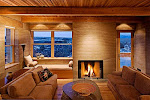Dear Kirk,L,
If you have a moment, I would like to ask your opinion about the current state of art and commercial architectural photography. My name is Lauren (27) and I'm interested in becoming an architectural photographer. I don't have formal background in photography, but have been learning architecture and photography on my own.
Yet, I'm hesitant about this career path because I'm unsure of the future state of it. The photography field seems so saturated with newcomers and to only want to specialize in architecture seems very limiting as well.
I've looked into the different paths of obtaining my MFA for personal growth or assisting a photographer, but as I have spoken with another photographer, I get the sense that this is not a niche field (architecture) as it used to be and because the photography field in general is saturated, commercial jobs are few and far between.
Is it possible that you can give your opinion on the state of the industry?
Thank you for your time,
L (via email)
A great question that I'm sure many people are pondering, especially in the economy.
There is an old adage in commercial photography, "There is always room for someone good". Yes there are tons of newcomers largely because of the accessibility to quality images because of current digital cameras. But in my area these newcomers tend to be lacking in an understanding of architecture, vision (which can be refined but not taught) and the basic canons of architectural photography like perspective correction (because they didn't learn the trade with the difficulties of film and view cameras). Many seem to think that poor technique is some new creative vision. One stands out from the crowd with refinement, not poor technique masquerading as cleverness. Hence these poorly trained newcomers seem to have no real impact on the knowledgeable market, where the decent budgets are. With the advent of reasonably priced high quality digital, used by inexperienced and low priced competition, my business has boomed. The economy scares me, but not the competition.
The AP market will evolve, but I don't see a time when it will be irrelevant. Computer graphics (CG) will make renderings and retouching seemless and believable, but there will always be a need for high quality interpretations of actual buildings as they were built for magazines, design competitions, portfolios etc. That is the strength of good APs. We can make anything look good.
You don't have to go to a formal school to become a top-notch architectural photographer, but you do have to school yourself. Assisting and workshops are a great source of knowledge as is studying the work of masters and trying to emulate it. With digital there is little cost (beyond the equipment) to practicing. You don't have to spend tons of money on film and processing for example. The drawback to self-education vs. formal education is the lack of constructive criticism. Most people have a hard time taking a good hard objective look at their own work. So in that regard, I am a believer in formal education and the kind of mentoring one can get in that environment. However, many of the greats have not had a formal photographic education. I came from both camps. formally trained in art schools, but learned the specifics of architectural photography totally on my own.
I don't know if that helps.
Kirk
Response from L,
Thank you Kirk for taking the time out to reply honestly. I'm still undecided on a concrete plan of action and I think it's going to be a long process of thought and action, but your perspective is helpful and appreciated. I'll keep researching, attending workshops and taking art classes.













No comments:
Post a Comment